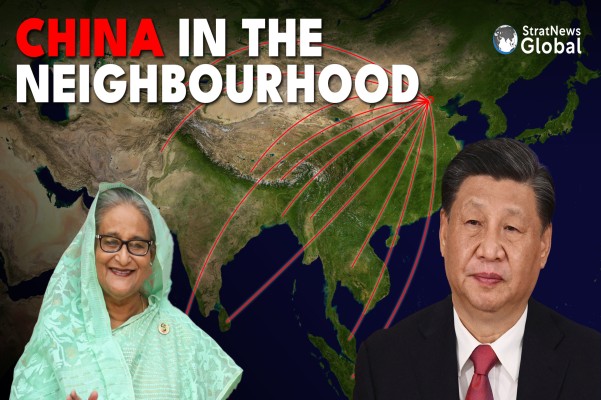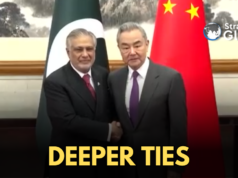Bangladesh is seen by many as the main success story of India’s neighbourhood First Policy, with both sides noting that the relationship was ‘the best that it has ever been.”
In fact, some reports say that the recent anti-government agitation in Bangladesh might have been fuelled using Islamists from Pakistan by China, which reportedly resents Dhaka’s growing alignment with New Delhi.
China is the largest investor in Bangladesh’s infrastructure by far, and over 75 per cent of Dhaka’s military arsenal –including two refurbished Ming Class Chinese submarines purchased in 2016 –is of Chinese origin.
China has also built BNS Sheikh Hasina, a submarine base in Pekua near Kutubdia island, Cox’s Bazar, about 322 km southeast of Dhaka, at an estimated cost of U.S. $1.21 billion.
“The Chinese will help us build the base and impart training to our personnel to operate the submarines and base. The Chinese submarines will not come here. The base is for our submarines,” Faruk Khan, chairman of Bangladesh’s parliamentary committee on foreign affairs, told BenarNews in 2019, in an attempt to assuage Indian concerns.
“Bangladesh procures weapons and military hardware from China as the United States and other countries usually do not sell those to us,” Maj. Gen. Abdur Rashid, (retd) a Bangladeshi defence analyst, was quoted as saying at the time.
Bangladesh has also joined the Belt and Road Initiative, Chinese President Xi Jinping’s flagship project aimed at expanding China’s global economic connectivity and clout, and during Hasina’s latest visit to Beijing earlier in July, the two sides agreed to upgrade their relationship to a “comprehensive strategic-cooperative partnership.”
The two nations also signed 28 agreements, mostly on trade, and agreed to speed up plans to launch a free trade agreement and more bilateral investments.
But perhaps due Beijing’s problems with the recovery of loans to other nations, as well as Dhaka’s reluctance to overextend its dependence on Chinese loans given Beijing’s predatory approach to those who have difficulty in repayment, China’s BRI investment in Bangladesh is far short of the $40 billion that was pledged in the early days of the project.
Bangladesh, which is still recovering from the impact of the pandemic and grappling with the economic fallout of the Ukraine crisis, which has led to its forex reserves dropping by more than half from an estimated $45 billion to about $20 billion.
Bangladesh had sought about $ 5 billion from China to help tide over this crisis. But Sheikh Hasina returned from Beijing with a commitment of a meagre $130 million. Although she claimed on her return that there was an additional $2 billion in the pipeline, there was no mention of this in the joint statement released at the end of her visit, which was abruptly cut short by a day.
While the official reason was Hasina’s desire to be with her daughter who was unwell, some media reports claimed this was to protest the lack of due protocol usually accorded to a visiting head of state.
Some experts believe China’s refusal to provide more financial assistance to Dhaka was due its annoyance over Sheikh Hasina’s decision to take up India’s offer to fund a Teesta River Comprehensive Management and Restoration Project, despite China having already offered a $1 billion fund for a similar project after conducting a feasibility study.
Others point to India’s recent acquisition of operational rights to a terminal at Bangladesh’s Mongla port as another reason for China’s annoyance.
As a senior intelligence and security expert who has dealt extensively with Bangladesh put it, “There are certain anti-India and pro-China elements with the Awami League and the government. They keep advising Hasina to tilt towards China as a more dependable ally than India. There are also some pro-China Bangladeshi businessmen today, and all these have helped build a cumulative Chinese influence on Bangladesh.
“On her part, Hasina wants to keep a line open with China so that anything goes wrong with India, she can lean on Beijing. For this in 2016, Hasina went for submarines from China causing irritants and massive reactions in India . Then Defence minister Manohar Parrikar dashed to Dhaka for damage control.
“Such a see saw will go on,” said the expert. “However recent curtailment by Hasina from her China visit merits a close review of the Chinese influence on Bangladesh. One should also factor Chinese reactions on the recent disturbing developments in Dhaka.”
Another expert on regional issues felt that while the Indo-Bangladesh relationship was based on a political and social alignment, the Dhaka-Beijing one was mostly economic. “But that does not mean we can be complacent about Chinese motives regarding Dhaka,” he warned.
In a career spanning three decades and counting, Ramananda (Ram to his friends) has been the foreign editor of The Telegraph, Outlook Magazine and the New Indian Express. He helped set up rediff.com’s editorial operations in San Jose and New York, helmed sify.com, and was the founder editor of India.com.
His work has featured in national and international publications like the Al Jazeera Centre for Studies, Global Times and Ashahi Shimbun. But his one constant over all these years, he says, has been the attempt to understand rising India’s place in the world.
He can rustle up a mean salad, his oil-less pepper chicken is to die for, and all it takes is some beer and rhythm and blues to rock his soul.
Talk to him about foreign and strategic affairs, media, South Asia, China, and of course India.





